Swimming in a pool with babies can be such a fun and cute experience. Everything from their tiny bathing suits and floppy sun hats to their large and brightly colored flotation devices will bring a smile to anyone’s face. Knowing what age can a baby go in a pool is an integral part of preparing for that experience.
Although a baby can get in a swimming pool at any age, many experts and parents are cautious about it. Some sources recommend allowing a baby to enter a pool as young as two months old, while others feel strongly that six months of age should be the youngest a baby enters a pool.
All parents and doctors have their own reasons for the ages they have deemed appropriate for when can babies go in the pool. Read on to explore some of those reasons and some precautions you can take once you do decide to take your baby into the pool.
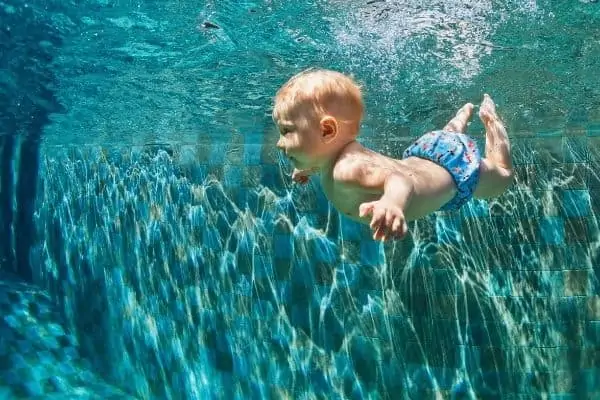
When Can Babies Go in a Pool?
If you’re a new parent, you may be wondering when it’s safe to take your baby swimming in a pool. While there’s no one-size-fits-all answer, there are some general guidelines to keep in mind.
According to the American Academy of Pediatrics (AAP), babies can start swimming in a pool when they are around 1 month old. However, it’s important to keep in mind that babies under 6 months old are more susceptible to illness and infection, so it’s important to take extra precautions to keep them safe.
One of the most important things to keep in mind when taking your baby swimming is to make sure the water is warm enough. The AAP recommends that the water temperature should be at least 85 degrees Fahrenheit for babies under 6 months old. You can also use a swim diaper and a snug-fitting swimsuit to help keep your baby comfortable and prevent leaks.
Obviously it is very important to keep a close eye on your baby while they’re in the pool and never leave them unattended. Make sure to keep them within arm’s reach at all times and be prepared for any emergencies by knowing CPR and having a phone nearby.
Do Babies Enjoy The Water?
We always see pictures of smiling babies splashing in a bathtub or floating happily in an infant floaty, with a joyful mother keeping it steady or enjoying swimming lessons at baby swim classes. We see them splashing and giggling even at very young ages. Do they really enjoy it as much as the baby pool ads make it seem like they do?
We may think of infants as being sensitive to water in its many forms. Still, if you think about it, when each baby is in utero, they spend about nine months floating in a warm liquid that, during the first five months of pregnancy, in particular, is made up of mostly water.
They are kept warm and safe within their mother’s belly, and the addition of being able to hear their mother’s steady heartbeat and loving voice only adds to the soothing nature of the environment.
When babies are born, the shock of being surrounded by air rather than water can be more startling than we might remember (We all did it once, right?). It’s pretty common for babies as young as a single day old to seem to enjoy a warm bath; they probably feel right at home!
Many parents can attest to their babies thoroughly enjoying their nightly bath time routine, and many of them enjoy taking a safe little swim in a warm pool with mom or dad just as much.
Babies can go into age-appropriate bathing tubs as soon as they are born. The speculation around when babies can go in a pool has more to do with what’s in the water rather than the water itself.
Swimming pools are different from bath time
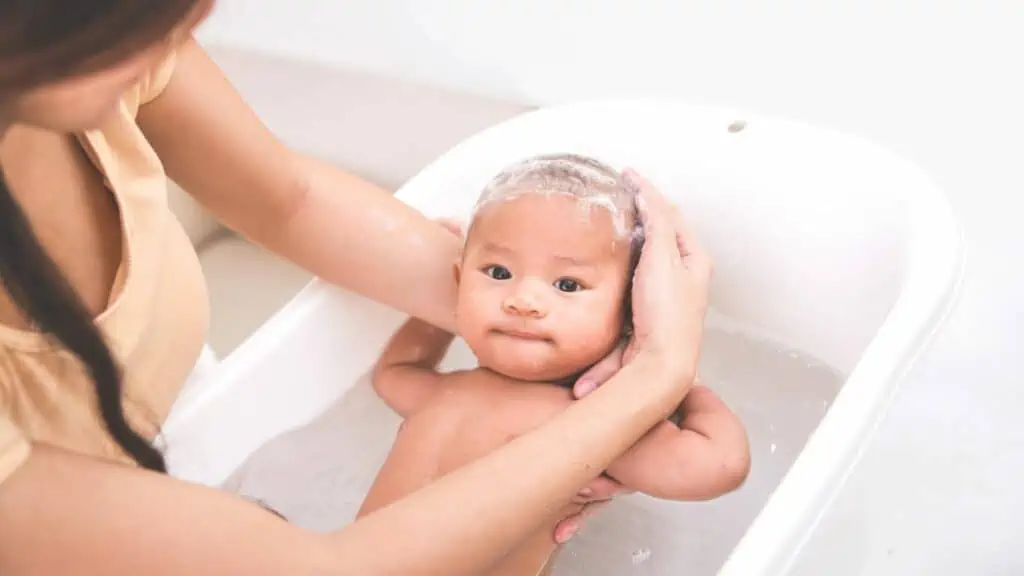
Pools can be slightly riskier than a warm bathtub for a newborn baby. The degree of the risk depends on the state of the water that fills the pool that the baby will be swimming in.
Frequently cleaned, well maintained, heated, private saltwater pools can be substantially less risky for a baby than murky, crowded, cold public swimming pools filled with chlorine that is rarely or barely cleaned.
Most pool risks to babies can be avoided with proper preparation and attentiveness by the caregiver. Some of these include, but are not limited to:
Drowning
According to Healthline.com, among children ages 1 to 4 years old, the highest number of deaths relating to injuries comes from drowning. It is a serious and heartbreaking statistic that should never be taken lightly or ignored.
In order to avoid any instances of drowning or dangerous water accidents, no baby or child should ever be left in or near a pool alone, without the supervision of a responsible adult.
Even when swimming with a baby, you should remember the following and take the necessary precautions:
- A baby should always be in the arms of a responsible and capable adult when in a swimming pool.
- Infant flotation devices, although seemingly safe, can still tip over or bounce enough for a baby’s head or mouth to become submerged. An infant in a flotation device should always remain within arm’s reach of the caretaker and should be watched carefully. Water wings and inflatable toys are not safety devices but swimming aids.
- Babies can swallow too much pool water without meaning to, and it can lead to many serious complications later on unless the caretaker is vigilant about keeping the infant’s head and mouth out of the water at all times.
- Babies can become slippery when wet, so a caretaker should hold the baby carefully when in the water and outside the water.
When these things are considered, and precautions are taken, it can seriously lower the risk of death by drowning for an infant.
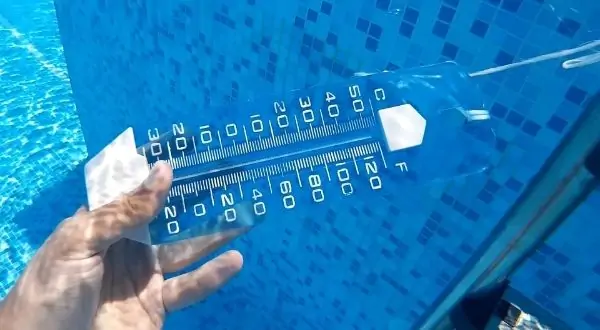
Temperature
Pools ranging in water temperatures between 78 and 86 degrees F, according to USMS.org, are considered comfortable for swimming, but babies have different needs.
Since a baby has more difficulty regulating their body temperature than an adult does, the water can drastically change their body temperature. They can quickly get too cold or too hot, which can lead to complications.
Babycenter.com recommends keeping the water temperature between 85 and 87 degrees Fahrenheit for the baby’s optimum temperature regulation and comfort. A baby should also never be allowed in water above 100 degrees Fahrenheit, as it will be too hot for them.
If you ever see that your baby is shivering in the pool or their lips, hands, or feet are getting blue, remove them from the water and try to get the baby warm with a dry towel or a warm bath.
Contamination
It’s no secret that many pools, especially public pools, can have a vast amount of bacteria and even viruses floating around in the water. These come from pool users in all different forms, and many of them are unavoidable and often harmless.
However, there are some instances where these contaminants can be dangerous for you and especially your baby. Babies under two months of age are more susceptible to illness and infection because their immune systems are not fully developed yet.
To keep your baby safe from these kinds of contaminants, make sure the water in the pool has been treated recently, and its water is cleaned and maintained well. Murky water or algae on the swimming pool’s walls or floor can be a testament to bacteria and harmful particles floating within the water.
Let’s not forget that, even wearing swim diapers, babies can contaminate the pool too as there is little you can do to prevent a baby from peeing in the pool (or worse) even if they are wearing a diaper.
Skin Irritation
While not all babies suffer from skin irritation after being in pool water due to the pool chemicals, it is not uncommon. Many babies have very sensitive skin, and the harsh chemicals in a pool can cause itchy or painful rashes afterward.
To avoid this scenario, simply wash your baby in a warm bath with clean water immediately after being in the swimming pool. You can use an infant shampoo or baby soap or just stick with warm water.
You may also want to consider applying some lotion, preferably a pediatrician-recommended infant or baby lotion, to your little one after they have been rinsed off. Chlorine can be drying for the skin, and this can help prevent any dryness for your baby.
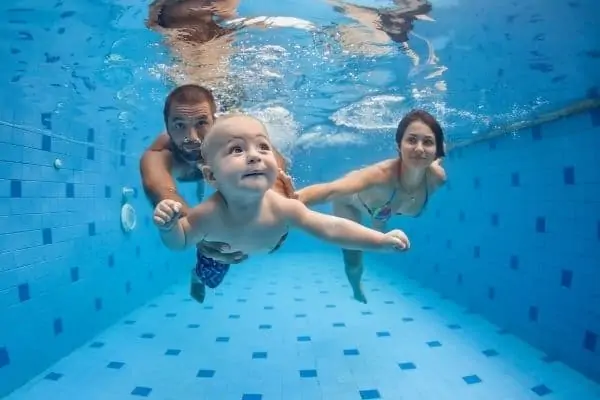
Fun in the Sun
These cautionary suggestions are meant to ensure that you and your baby can stay safe in the swimming pool. Once you have considered them and taken the necessary precautions, you are good to go!
Get your little one in a swim diaper, spread on some sunscreen, toss on a floppy hat and a tiny swimsuit and get splashing. Don’t forget to document the milestone moment with a picture of your baby’s first time in the pool!
You will also be able to find baby swimming lessons locally – it is never too early to teach them to swim.
Can a baby go in a hot tub?
Hot tubs are usually kept at far too high a temperature to allow a baby to be allowed to go in one. Babies’ body temperatures cannot be regulated as easily as adults so they can quickly overheat so being in hot water can be very dangerous.


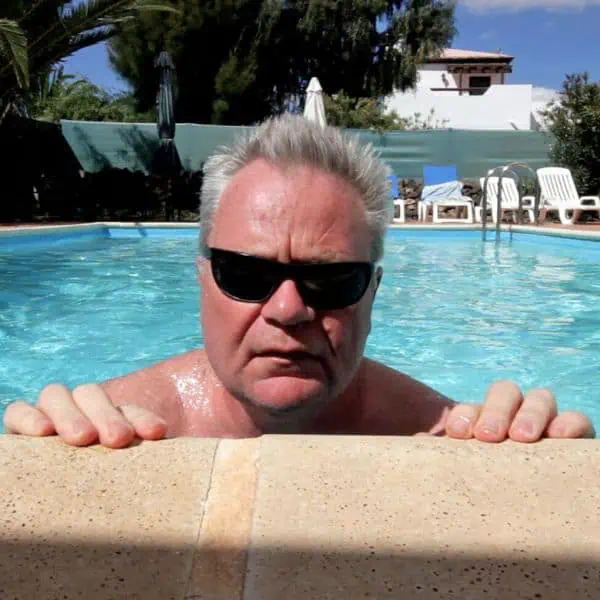


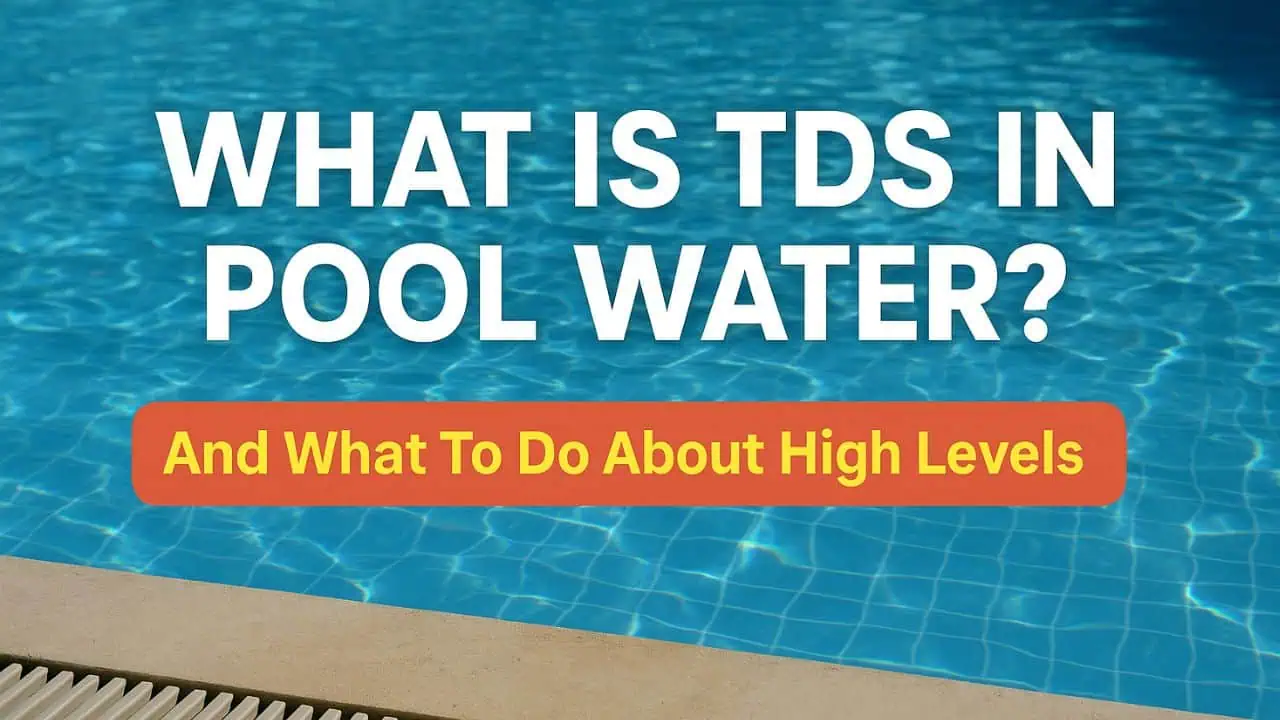
Leave a Reply